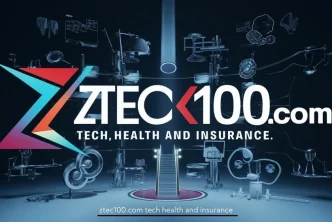Blockchain technology has emerged as one of the most transformative innovations of the 21st century. Initially popularized by its association with cryptocurrency, blockchain is now finding applications across a wide array of industries, revolutionizing everything from finance to healthcare to supply chain management. In its essence, blockchain offers a decentralized, secure, and transparent way to record transactions and store data, which has profound implications for how businesses operate. This article will explore how blockchain technology is revolutionizing various industries, the advantages it offers, and the challenges it presents.
What is Blockchain Technology?
Understanding the Basics
Blockchain is a type of distributed ledger technology (DLT) that allows data to be stored across a network of computers in a secure, transparent, and immutable manner. The data is organized into “blocks,” which are linked together in a “chain.” Each block contains a list of transactions, a timestamp, and a reference to the previous block, making it nearly impossible to alter the data once it’s been recorded.
Unlike traditional centralized databases, where a single entity controls and verifies the data, blockchain operates on a decentralized network. This means that no single party has control over the data, and transactions are verified through consensus mechanisms that ensure accuracy and trust. The result is a more secure and transparent system for recording and verifying transactions.
Key Features of Blockchain
- Decentralization: No central authority controls the blockchain, making it resistant to censorship and fraud.
- Transparency: All participants can view the entire history of transactions, ensuring transparency.
- Security: Blockchain uses cryptographic techniques to secure data, making it nearly impossible to alter or hack.
- Immutability: Once a transaction is recorded on the blockchain, it cannot be changed, ensuring the integrity of the data.
- Smart Contracts: These are self-executing contracts with the terms of the agreement directly written into code. They automate and enforce agreements between parties.
How Blockchain is Revolutionizing Industries
Blockchain is having a significant impact on multiple industries. Below, we will explore how it is changing key sectors such as finance, supply chain management, healthcare, and more.
1. Finance: The Rise of Decentralized Finance (DeFi)
Transforming Traditional Banking
Blockchain’s most significant impact has been in the financial sector. Cryptocurrencies like Bitcoin and Ethereum, which rely on blockchain technology, have disrupted traditional financial systems by enabling peer-to-peer transactions without the need for banks or intermediaries. However, the impact of blockchain extends far beyond cryptocurrencies.
Blockchain technology is at the heart of
Decentralized Finance (DeFi), a movement that seeks to recreate traditional financial services such as lending, borrowing, and trading on blockchain platforms. DeFi uses blockchain’s transparency and security features to eliminate the need for centralized intermediaries, such as banks, brokers, and payment processors.
Key Benefits of Blockchain in Finance:
- Lower Transaction Costs: By eliminating intermediaries, blockchain reduces transaction fees, which can be significant in traditional banking systems.
- Faster Transactions: Blockchain enables near-instantaneous transactions across borders, compared to the delays often associated with traditional banking.
- Increased Accessibility: Blockchain opens up financial services to people who are unbanked or underbanked, particularly in developing countries where traditional banking infrastructure is limited.
- Security and Fraud Prevention: Blockchain’s encryption and decentralized nature make it more resistant to hacking and fraud compared to traditional centralized systems.
Real-World Applications in Finance
- Cryptocurrencies: Bitcoin, Ethereum, and other cryptocurrencies are digital assets that use blockchain to facilitate secure transactions and store value.
- Cross-Border Payments: Blockchain technology enables faster and cheaper cross-border payments, reducing the time and cost involved in international money transfers.
- Decentralized Lending and Borrowing: Platforms like Aave and Compound allow users to lend and borrow cryptocurrencies without relying on traditional banks.
2. Supply Chain Management: Enhancing Transparency and Efficiency
Revolutionizing Logistics and Provenance Tracking
One of the most powerful uses of blockchain technology is in
supply chain management. Blockchain can provide real-time, immutable records of every step in the supply chain, from the sourcing of raw materials to the final delivery of goods. This level of transparency is invaluable for both businesses and consumers, as it allows for improved tracking, accountability, and verification.
Benefits of Blockchain in Supply Chain Management:
- Transparency: Blockchain allows for end-to-end visibility in the supply chain, enabling businesses and consumers to track products from origin to final destination.
- Reduced Fraud: By ensuring the accuracy and immutability of data, blockchain helps reduce the risk of fraud and counterfeit products, particularly in industries like pharmaceuticals and luxury goods.
- Increased Efficiency: Blockchain can automate processes, reduce paperwork, and streamline communication between parties, resulting in faster and more efficient supply chain operations.
- Improved Accountability: Blockchain creates an immutable record of every transaction, helping businesses hold suppliers accountable for delays or quality issues.
Real-World Applications in Supply Chain
- Provenance Tracking: Companies like IBM Food Trust use blockchain to track the journey of food products, ensuring that they are sourced ethically and are safe for consumption.
- Inventory Management: Blockchain can help automate inventory management, reducing the chances of human error and improving stock accuracy.
- Cross-Border Trade: Blockchain can streamline customs procedures and reduce delays in cross-border trade, particularly by improving the verification of goods and documentation.
3. Healthcare: Securing Patient Data and Streamlining Processes
Revolutionizing Data Management and Interoperability
In the healthcare industry,
data security and
interoperability are critical concerns. Blockchain offers solutions to both. Healthcare organizations collect vast amounts of sensitive data, including patient records, medical histories, and billing information. Blockchain’s ability to store this data securely and ensure privacy could transform how healthcare systems operate.
Key Benefits of Blockchain in Healthcare:
- Enhanced Security: Blockchain’s encryption ensures that patient data is secure and protected from unauthorized access or tampering.
- Improved Data Sharing: Blockchain enables secure data sharing between healthcare providers, allowing for better collaboration and more efficient patient care.
- Better Patient Control: With blockchain, patients could have greater control over their own healthcare data, granting or revoking access to different providers as needed.
- Reduced Fraud: Blockchain’s transparency makes it easier to detect and prevent fraudulent billing or misuse of insurance claims.
Real-World Applications in Healthcare
- Patient Records: Blockchain can be used to store and manage electronic health records (EHR), ensuring that they are secure, immutable, and accessible to authorized medical professionals.
- Drug Traceability: Blockchain can track the provenance of pharmaceuticals, reducing the risk of counterfeit drugs entering the supply chain.
- Clinical Trials: Blockchain can help manage and verify clinical trial data, ensuring its accuracy and transparency.
4. Real Estate: Simplifying Transactions and Enhancing Trust
Revolutionizing Property Transactions
Blockchain is also making its mark in the
real estate industry, where it has the potential to simplify property transactions, reduce paperwork, and improve trust between buyers, sellers, and brokers. Blockchain can be used to create smart contracts, which are self-executing agreements that automatically trigger actions when predefined conditions are met.
Benefits of Blockchain in Real Estate:
- Faster Transactions: Blockchain enables faster and more secure property transactions by automating processes and reducing the need for intermediaries.
- Reduced Fraud: Blockchain’s immutability ensures that property records are accurate and tamper-proof, reducing the risk of fraud.
- Increased Transparency: Blockchain can track the history of a property, including ownership and transaction records, making it easier for buyers to verify the legitimacy of a property.
Real-World Applications in Real Estate
- Property Title Management: Blockchain can be used to store property titles and deeds, ensuring that ownership records are secure and easily accessible.
- Smart Contracts: Real estate transactions can be automated through smart contracts, ensuring that conditions are met before payments are processed.
- Tokenization of Assets: Blockchain allows for the tokenization of real estate, enabling fractional ownership and reducing barriers to entry for investors.
5. Voting Systems: Enhancing Democracy and Transparency
Securing Elections with Blockchain
Blockchain has the potential to revolutionize
voting systems by ensuring that elections are fair, transparent, and secure. Traditional voting systems are often vulnerable to fraud, manipulation, or errors, which can undermine public trust in the electoral process. Blockchain offers a solution by providing a secure, transparent, and immutable record of votes.
Benefits of Blockchain in Voting Systems:
- Security: Blockchain ensures that votes cannot be tampered with or altered, making it highly secure against fraud or hacking.
- Transparency: Voters can verify their votes through a blockchain-based system, increasing trust in the electoral process.
- Accessibility: Blockchain could make it easier for people in remote or conflict-prone areas to vote securely and transparently.
Real-World Applications in Voting
- Online Voting: Blockchain could facilitate secure and transparent online voting, making it easier for citizens to participate in elections.
- Election Audits: Blockchain provides an immutable record of all votes, making it easier to audit election results and ensure their integrity.
Conclusion: The Future of Blockchain
Blockchain technology is undoubtedly revolutionizing a wide range of industries by enhancing transparency, security, and efficiency. While its full potential is still being realized, the impact of blockchain is already visible in sectors like finance, supply chain management, healthcare, and real estate. As businesses and governments continue to explore and implement blockchain solutions, it is likely that the technology will become even more integrated into everyday operations.
However, there are still challenges to overcome, such as scalability, regulatory concerns, and the environmental impact of blockchain mining. Despite these hurdles, blockchain’s ability to provide secure, decentralized, and transparent systems positions it as one of the most transformative technologies of the future. The blockchain revolution is just beginning, and its influence will continue to grow in the years to come.
Read More latest Posts





